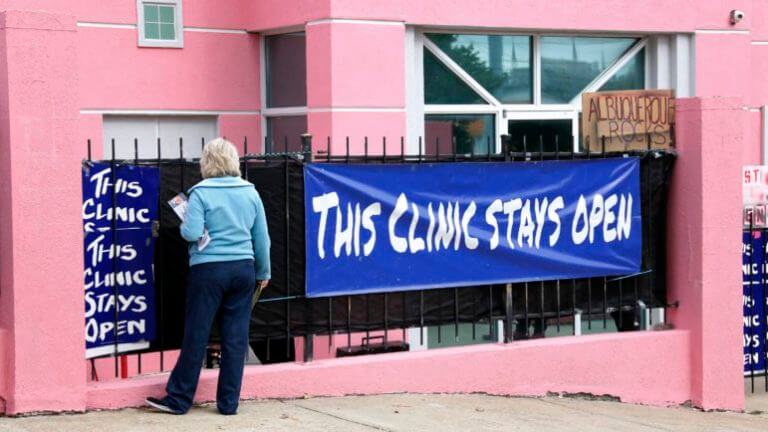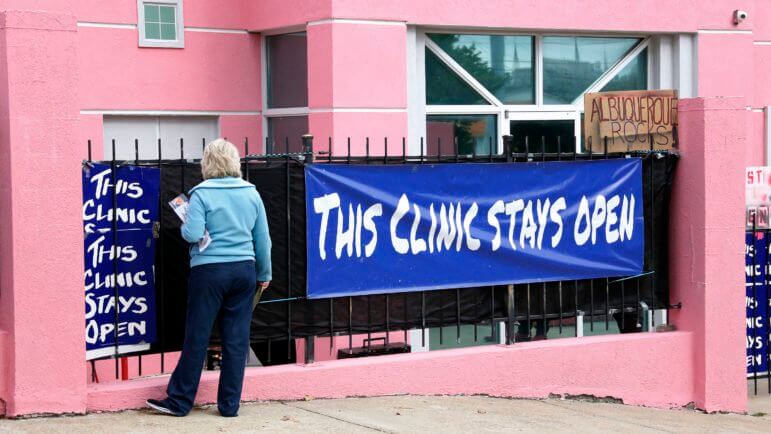

Rogelio V. Solis, AP
Jackson Women’s Health Organization
Mississippi’s currently-blocked law that bans abortions after 15 weeks should not be heard by the U.S. Supreme Court, attorneys said last week.
“The state has asked the Supreme Court to review the 5th Circuit decision striking down the 15 week ban and we are telling the Supreme Court that there’s absolutely no need to review that decision — the 5th Circuit decision was correct based on decades of precedent about pre-viabilty ban,” Hillary Schneller, lead attorney representing the Jackson Women’s Health Organization, told Mississippi Today about the new court filing.
The law has been overturned by federal courts twice in two years. This was the first of recent abortion bans to be passed by a state, blocked by federal courts, and if taken up by the Supreme Court, would be the first to make it that far. Up to now, the Court has declined to take up any recent cases banning abortion at various points in pregnancy.
“It speaks to the state’s relentless attempts to ban or restrict abortion and just make it harder and harder and harder for people to access important reproductive health care,” Schneller said. “It’s both something new and more of the same. It’s not new that the state is trying to restrict abortion, but they’re continuing to get more and more aggressive about it.”
After years of Mississippi abortion regulations winding through lower courts, Attorney General Lynn Fitch in June petitioned the nation’s highest court to hear the 15-week case on appeal of a lower court’s 2019 ruling that blocked the unconstitutional law. The U.S. 5th Circuit Court of Appeals’ decision last year was the second court to block the 2018 law, after U.S. District Judge Carlton Reeves initially blocked it shortly after it was passed by the Mississippi Legislature and permanently overturned it eight months later.
Despite the quick succession of courts ruling the law unconstitutional, Mississippi’s Legislature passed an even stricter law the following year, banning abortions after six weeks of pregnancy. It too was blocked by the same two respective federal courts. Instead of appealing the more recent law to the Supreme Court, Fitch recently announced that she would revert to the less strict, 15-week law for appeal.
“The petition asks the Court to clarify its jurisprudence on abortion to allow states like ours to enact laws that further their legitimate interest in protecting maternal health, safeguarding unborn, and promoting respect for innocent and vulnerable life,” she said in a statement. Her office did not respond to questions about the case.
In its first abortion case with the newly aligned conservative bench — watched by reproductive rights advocates and opponents as a barometer of cases to come, as 17 states passed laws limiting abortion access in 2019 alone — the Supreme Court in June upheld abortion rights by allowing a Louisiana clinic to remain open.
The new brief — filed last week by the Center for Reproductive Rights on behalf of the state’s sole abortion clinic, Jackson Women’s Health Organization — asks the court to deny the state’s request to hear the case based on precedent. The Supreme Court traditionally takes a case when there are conflicting interpretations across circuit courts, or after new questions or evidence have been raised. Neither is the case here, according to the new filing.
“Both the United States Court of Appeals for the Fifth Circuit and the district court correctly held that this unconstitutional law cannot stand. The decision below properly applies this Court’s precedent and does not conflict with the decision of any other court,” reads the filing. “Nothing about this case warrants this Court’s intervention.”
The filing goes on to say that the state misinterprets its legal role in regulating abortion — something both parties have argued over before. Mississippi says its interest in “protecting unborn life, regulating the medical profession, and protecting maternal health” should override individual rights to choose abortion before viability. States do have a vested interest in regulating abortion, but they can’t outright ban the procedure, per precedent. Before a pregnancy is viable — usually around 23 to 24 weeks — the state can regulate, but not prohibit, abortion.
Mississippi has argued in court that its 15-week law is “not per se” a prohibition and that the viability framework needs to be revisited — despite consensus among medical professionals that limiting abortion access is more dangerous than the procedure itself: “Legislative restrictions fundamentally interfere with the patient–provider relationship and decrease access to abortion for all women, and particularly for low-income women and those living long distances from health care providers,” according to the American College of Obstetrics and Gynecology.
In the first decision to block the law, Judge Reeves outlined that the law is a prohibition, not just a regulation, and how that dooms the law: “States may not ban abortions prior to viability … 15 weeks (since last menstrual period) is prior to viability … the Act is unlawful.”
The 5th Circuit upheld the decision saying that “prohibitions on pre-viability abortions … are unconstitutional regardless of the State’s interests because,” quoting Planned Parenthood v. Casey, the 30-year-old case that affirmed Roe v. Wade, “‘a State may not prohibit any woman from making the ultimate decision to terminate her pregnancy before viability.’”
During oral arguments at the 5th Circuit last year, the three-judge panel did separately push state attorneys on their claims that the law was not a prohibition and clinic attorneys on whether or not it was time to revisit the viability question.
Ultimately, the Circuit Court found they were “duty bound” to affirm the District’s decision, though they criticized its language admonishing Mississippi’s motives.
In his decision permanently blocking the 15-week law, Reeves called attempts to push unconstitutional laws through “disingenuous.”
“No, the real reason we are here is simple. The State chose to pass a law it knew was unconstitutional to endorse a decades-long campaign, fueled by national interest groups, to ask the Supreme Court to overturn Roe v. Wade,” Reeves wrote. “The Mississippi Legislature’s professed interest in ‘women’s health’ is pure gaslighting. . . . Its leaders are proud to challenge Roe but choose not to lift a finger to address the tragedies lurking on the other side of the delivery room: our alarming infant and maternal mortality rates.”
Mississippi has among the nation’s highest worst maternal health outcomes and currently the highest rate of infant mortality. Conversely, complications from abortions are rare, especially in Mississippi where almost all happen in the first trimester and are delivered medically, by pill, rather than surgically. Though their likelihood of complication increases with duration of pregnancy, Jackson Women’s Health Organization — the only clinic in the state — does not perform abortions after 16 weeks.
More than 90 percent of abortions in Mississippi in 2016 were performed before 14 weeks of gestation and 65 percent were before 9 weeks, according to the U.S. Centers for Disease Control and Prevention’s most recent data. More than a quarter of abortions in the U.S. are medically delivered rather than surgically, while almost two-thirds of abortions in Mississippi are delivered this way.
“Mississippi already has a number of restrictions and over-regulations of abortion that make it hard for everyone, in particular folks who are already struggling to access essential health care. That becomes more difficult in times of crisis, like the public health crisis we’re in right now,” Schneller, clinic attorney, said. “So the fact that the state is continuing to fight this fight all the way up to the Supreme Court is not unexpected, but is disappointing that this is where their efforts continue to be focused.”
The post Mississippi’s only abortion clinic asks Supreme Court to decline 15-week ban case appeared first on Mississippi Today.
- Senate negotiators a no-show for second meeting with House on Medicaid expansion - April 25, 2024
- MDOC promotes inmate boxing program, but lawmakers say money could be better spent - April 25, 2024
- Medicaid expansion debate stirs memories of family medical debt for Mississippi senator - April 25, 2024